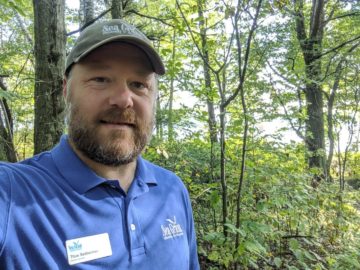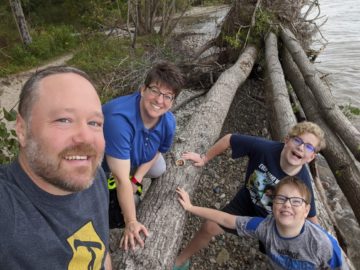During this Franciscan month Franciscan Sisters of Christian Charity feature Titus Seilheimer, PHD Biologist, who serves as a fisheries specialist with Wisconsin Sea Grant with field house in Manitowoc, Wisconsin.
Tell us about yourself.
 My name is Titus Seilheimer and I’ve been the fisheries specialist with Wisconsin Sea Grant since 2012. I grew up in northwestern Wisconsin on the edge of the Northwoods. I spent a lot of time in and around water growing up, so I was exited to learn that studying water was a career when I was working on my biology degree in Appleton! I moved to Hamilton, Ontario to study Great Lakes coastal wetland fish habitat for my Ph.D. and then lived in Oklahoma, New York, and Minnesota before returning to Wisconsin. I’ve been working on the Great Lakes for most of the last 20 years, with a few years studying the ecology of Oklahoma springs and streams mixed in there. I live in Manitowoc with my wife and two sons. We spend a lot of time on the Lake Michigan coast and enjoy exploring the streams, beaches, and parks. I spend a lot of time in the warmer months exploring Manitowoc County at 15 mph on my bike.
My name is Titus Seilheimer and I’ve been the fisheries specialist with Wisconsin Sea Grant since 2012. I grew up in northwestern Wisconsin on the edge of the Northwoods. I spent a lot of time in and around water growing up, so I was exited to learn that studying water was a career when I was working on my biology degree in Appleton! I moved to Hamilton, Ontario to study Great Lakes coastal wetland fish habitat for my Ph.D. and then lived in Oklahoma, New York, and Minnesota before returning to Wisconsin. I’ve been working on the Great Lakes for most of the last 20 years, with a few years studying the ecology of Oklahoma springs and streams mixed in there. I live in Manitowoc with my wife and two sons. We spend a lot of time on the Lake Michigan coast and enjoy exploring the streams, beaches, and parks. I spend a lot of time in the warmer months exploring Manitowoc County at 15 mph on my bike.
What is it that you do for Wisconsin Sea Grant Advisory Team?
I’m a fisheries specialist, which basically means I am the go-to fisheries and aquatic ecologist at Wisconsin Sea Grant (WISG). I am the WISG contact person for Sheboygan to Kewaunee Coutnies but also cover fisheries issues in Lake Michigan and Superior. WISG is a one of 34 Sea Grant programs located throughout the US coast regions, from Guam to Maine and Alaska to Puerto Rico, but more importantly in all the Great Lakes states! Our work is a mix of outreach, education, and research that helps to support science-based decision making and the better understanding of the ecology of the Great Lakes.
I’ve been in the WISG Manitowoc field office for nearly 8 years and over that time I’ve worked on a lot of different topics and issues. I have been working closely with the Lake Michigan commercial fishers to better understand the seasonal catch of bycatch and other species. From 2015 to 2019, I spent over 100 days on the trawler Perter Paul out of Two Rivers and handled a lot of fishes! That research helped the WI Department of Natural Resources to make management decisions about the use of trawling to harvest lake whitefish. I’ve also talked to a lot of groups of anglers, local residents, and students about the ecology of the Great Lakes and how invasive species have changed the lakes. My work has also included marine debris issues, including ghost fishing nets and beach litter, aquaculture, coastal habitat, and other issues.
What is unique about your Lake Michigan location?
My office is located at the University of Wisconsin -Green Bay Manitowoc Campus, which I think has the best Great Lakes view in the whole UW system! Although Wisconsin Sea Grant is a program based at UW-Madison, my office is here on the coast so I can have better connections with coastal residents (I am one!) and stakeholders. It has been fascinating to watch the coast change from the record low water levels when we moved here in late 2012 to the record high water levels in 2020. The projections have water levels starting to decline which will be a relief for many coastal residents that have been impacted by erosion. My family and I love living close to the lake and take advantage of the proximity often.
Do you feel some might not fully appreciated what a valuable resource the Great Lakes are? What would be one thing you’d hope people would appreciate more about the Great Lakes?
The Great Lakes are a globally unique resource! I think people who grow up on them might take the lake for granted because the lake is always here. People farther inland in Wisconsin know the lakes are there but might not think about them much. I always point out that we have an amazing amount of freshwater at out doorstep. I’ve spent a lot of time working and meeting with Great Lakes residents in all the states and provinces. There is a lot of passion for protecting these resources and improving the habitat in the Great Lakes and I think it is worth the effort of traveling to spend some time on the Great Lakes coast. Make your own Great Lakes stories and memories!
There are some great facts about the Great Lakes that can open eyes. The total amount of coastline in the Great Lakes is just over 10,000 miles! We have 820 miles of coast in Wisconsin alone, which makes Wisconsin a coastal state! If we tipped the water in the Great Lakes onto the lower 48 states, it would cover them in 9 feet of water! Most of that water (55% of all the Great Lakes water) is in Lake Superior.
What advice do you have for young people interested in the environment?
There are a lot of career opportunities and paths for young people who are interested in the environment. I think they should start looking at the options early and try out some different types of science. I work for a university but there are opportunities to work in government, non-governmental organizations, education, industry, farming, and more. There are different job opportunities with different levels of education and experience, so try some things out and see what you really enjoy doing. I get to work with fish but also help people and show them how amazing the Great Lakes are!
Contact information: https://www.seagrant.wisc.edu/bio/titus-seilheimer/


